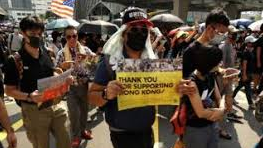The law fits squarely within both the hawkish turn in China policy specifically and the tradition of U.S. human rights policymaking generally.
 Washington DC, Nov. 30.– The Hong Kong Human Rights and Democracy Act is now law. Technically an amendment to the 1992 United States-Hong Kong Policy Act, which established that the United States would continue to treat Hong Kong as a separate economic and trade zone after the 1997 British handover to the People’s Republic of China, the new law requires the Secretary of State to certify whether Hong Kong remains “sufficiently autonomous” from the PRC to retain its special status.
Washington DC, Nov. 30.– The Hong Kong Human Rights and Democracy Act is now law. Technically an amendment to the 1992 United States-Hong Kong Policy Act, which established that the United States would continue to treat Hong Kong as a separate economic and trade zone after the 1997 British handover to the People’s Republic of China, the new law requires the Secretary of State to certify whether Hong Kong remains “sufficiently autonomous” from the PRC to retain its special status.
It also requires the President to identify, report on, and sanction anyone who is illegally transshipping American exports to third countries via Hong Kong. Finally, the act declares that the U.S. shall not deny visas to Hong Kong applicants who have been arrested or detained because of protest activities.
Some aspects of the new law are unremarkable. It restates plenty of existing policy language, such as its many references to the 1984 Sino-British Joint Declaration and the Basic Law as the foundation for Hong Kong’s status based on the “one country, two systems” principle. Its general goals are also consistent with the longstanding U.S. claim that democracy and human rights are integral parts of the nation’s relationship with Hong Kong.
Nor are the new reporting requirements ground-breaking on their face, since Congress requires the executive to furnish reports on nearly every foreign policy issue. The U.S. Trade Representative (USTR) and the Department of Defense have reported on China’s WTO compliance and on Chinese military and security developments, respectively, since 2002, while the State Department has reported on international human rights since the 1970s, on the Hong Kong Policy Act since 1997, on religious freedom since 1999, on human trafficking since 2001, and on democracy promotion since 2003.
(...)
[ Full text ]
Comments powered by CComment